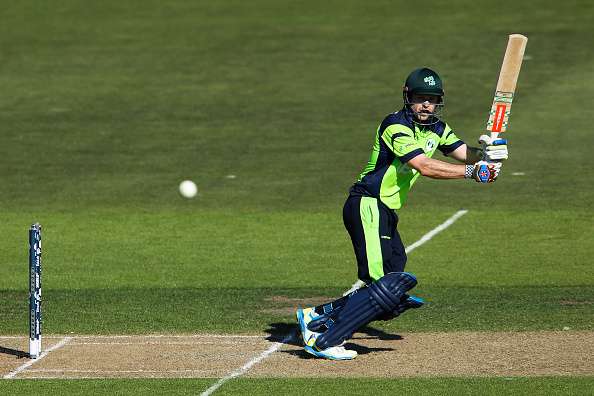By Tim Wigmore
Despite the ICC’s decision to shrink the 50-over World Cup there have been some highlights in the past 12 months – many involving performances of the highest standard.
If only the game’s administrators could have matched the vision and passion of the players from the Associate nations.
There have, of course, been some disappointments but, generally, some of the sport’s greatest tales have come from outside the elite level, enough, certainly, to shame the ICC.
Team Performance of the year – Ireland v West Indies
As they were never shy to point out, Ireland arrived at the World Cup having played just nine ODIs against Test opposition in the previous four years.
Against the West Indies, Paul Stirling, Ed Joyce and Niall O’Brien combined to chase down 305 and, in so doing, delivered “a two-fingered salute to those who would see the World Cup shrink in size, scope and ambition,” as Michael Atherton put it.
And because Ireland’s win came on the third day of the World Cup, it ensured that the deplorable treatment of Associate nations attracted unprecedented coverage for the next month.
Worst ICC decision of the year – the 10-team World Cup
In a crowded field, the ICC’s intransigence about the 2019 and 2023 World Cup was staggering.
Despite the Associate nations performing better than ever in the 2015 tournament, the ICC board did not even formally discuss overturning the planned contraction of the 2019 and 2023 World Cups – a decision, as David Richardson admitted, largely driven by the wish to guarantee India nine games. In a year in which Japan defeated South Africa in the Rugby World Cup, and the sport considered expanding its 20-team World Cup to 24 teams, it was a damning indictment of the lack of vision of Australia, England and India. And it made the ICC’s stated vision – to make cricket the “world’s favourite sport” – look a very bad joke.
Encouraging news of the year – Olympic dreams
For all the rightful indignation over the World Cup and the paucity of funding for Associates, there were some tentative reasons to be optimistic for those willing to look hard enough.
Afghanistan and Ireland benefited from inclusion in a new 12-team ODI structure and enjoyed a modest uptick in fixtures against Test nations, while cricket edged closer to inclusion in the 2022 Commonwealth Games in Durban.
Most significant of all was Colin Graves’ announcement that the ECB, implacable opponents of joining the Olympic Games under the Giles Clarke regime, now backed cricket appearing in the Games, a development that could lead to governments around the world investing millions of dollars in the sport.
Best celebration – Afghanistan’s World Cup win
To see Shapoor Zadran take off in jubilation and slump to his knees was to see sport at its best.
Afghanistan had just sealed their maiden World Cup win – an agonising one-wicket triumph over Scotland – and continued international cricket’s most intoxicating good news story of the decade. If only cricket’s governing elite would show them a little more encouragement.
History making of the year – Afghanistan in Zimbabwe
For all the unadulterated joy of their World Cup win in Dunedin, an even more significant landmark in Afghan cricket arrived in Zimbabwe in October. Afghanistan won the ODI series 3-2, and so became the first Associate nation to beat a Test country in an ODI series. When they won the t20 series 2-0, it only made the chasm between Afghanistan and Zimbabwe in terms of status, funding and fixtures look all the more absurd.
Pointless prize of the year – ODI status
Sixteen nations have ODI status, meaning they have the right to play official ODIs against any side in the world.
But for a quarter of these nations – Scotland, the UAE, Hong Kong and Papua New Guinea – this apparent prize means nothing. Outside the World Cup, none played a single ODI against a Test nation in 2015.
England’s one-day warm-up against Hong Kong in November was unofficial – meaning the ECB did not have to pay their players ODI match fees – and was emblematic of the lack of regard many Test nations have for expanding the sport.
Scapegoat of the year – Andrew Leonard
During the World Cup, the ICC’s Twitter account copped ferocious abuse about the decision to reduce the next two tournaments to ten teams.
But here’s the thing: the ICC’s digital and social media manager, and the man responsible for most of the tweets is an Irishman, Andrew Leonard.
He probably wasn’t best pleased about the ICC’s apparent disdain for his countrymen, either.
Comeback of the year – Mohammad Shazhad
With his impudence at the crease, audacious helicopter shot and portly frame, Mohammad Shazhad is one of Afghanistan’s first cricketing icons.
Yet he did not make their squad for the World Cup, as Afghanistan’s selectors tired of his inconsistency and lack of fitness.
First Shazhad lost some weight, then he unleashed his wrath on opposition bowlers – first in the WT20 qualifiers, and then under new coach Inzamam-ul-Haq during Afghanistan’s series win against Zimbabwe.
Young player of the year – Mark Chapman
On November 16, Mark Chapman became the tenth cricketer to make a century on ODI debut. Only one has been younger than Chapman, who feels like the oldest 21-year-old in international cricket today.
In a sense he is: it is almost five years since his Hong Kong debut, and Chapman is already vice-captain. The only snag is he might not be seen in a Hong Kong shirt much longer: Chapman has lived in New Zealand since the age of 14 and has made his debut for Auckland.
Team of the year – Oman
Oman arrived in July for the World T20 qualifiers as the 29th ranked team in international one-day cricket, accustomed to playing in temperatures of 50 degrees, not the 15 degrees they found in Ireland and Scotland.
Yet, aided by three weeks’ acclimatisation in Cork and some local expertise from The Cricket Paper’s very own Derek Pringle, Oman ended the tournament by besting Namibia in a play-off to secure their passage to India next March. Here was stirring proof, too, of the growing depth in the Associate world.
Disappointment of the year – Nepal
No country has more zealous fans than Nepal, but too often the players seem burdened by these expectations.
So it was again in the World T20 qualifiers: Nepal were rag-tag with the bat and in the field, where captain Paras Khadka again showed an inability to adapt his plans under pressure. The upshot was one victory and four defeats, including a thumping by Jersey. Nepal were no better in the World Cricket League Championship, either, losing all four matches they played.
Innings of the year – Kyle Coetzer
No Associate innings was more scintillating than Kyle Coetzer’s against Bangladesh in Nelson. Launching the ball nonchalantly down the ground against pace and sweeping with panache, Coetzer’s 156 more than doubled the previous highest score made by a Scot in a World Cup – and against the bowling attack that would soon eliminate England.
Even defeat could not detract from an innings magnificent in its brutality.
Best bowling spell – Peter Borren
There is nothing spectacular about Peter Borren’s bowling.
He oozes effort from every pore, but rare is the delivery quick enough to trouble a motorway speed camera. At 150-6 in pursuit of 201 until Borren called upon himself to bowl, Scotland were on course to win their Intercontinental Cup match in September.
It took Borren just 16 balls of wicket-to-wicket seamers to claim all four remaining wickets for a solitary run and lead the Netherlands to victory.
Sometimes it is a simple game.
Player of the year – Ed Joyce
Off the pitch, Ireland’s Ed Joyce denounced the myopia of cricket’s governing elite – above all, their decision to contract the next two World Cups to ten teams and the paucity of fixtures for Associates in between world events – at every turn.
And the grace and power of Joyce at the crease, especially in a sparkling 67-ball 84 in the victory over the West Indies at Nelson, meant his words could not be ignored.
Now in his 38th year, Joyce remains the outstanding player in the Associate world, a point reinforced by double centuries in both of Ireland’s Intercontinental Cup wins. Joyce has often been spoken of as the best county player of his generation not to win a Test cap.
But he might yet do so for Ireland, who are firmly on course to play in the Test Challenge against Zimbabwe in 2018, knowing that Test status will result if they win the four-match series.
This piece originally featured in The Cricket Paper, Thursday December 24 2015















